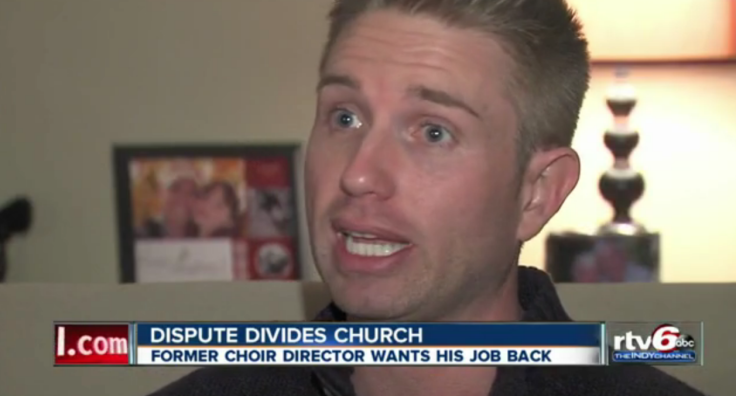Methodist Church That Fired Gay Choir Director Shuts Down, Cites ‘Downward Spiral’ Of Membership

An Indiana church that fired its gay choir director will shut down at the end of the year. David Mantor, pastor of the First United Methodist Church in Alexandria, cites declining membership and financial troubles as the cause -- not the fact that 80 percent of its members left after Adam Fraley was fired, the Herald Bulletin reports.
Fraley, who attended the church with his partner for six years, also served as its choir director. When Mantor was hired, Fraley said the new pastor felt “uncomfortable” with him in the leadership position. He was told he couldn't keep his position because of his sexual orientation.
“The pastor that’s currently at the church, doesn’t want to work, or doesn’t feel like he can work with somebody, that is like me,” Fraley told local news station WISH in January.
According to United Methodist Church doctrine, gays are welcome but “self-avowed, practicing homosexuals” can't “serve” the church. After Fraley was fired, about 80 percent of the congregation left, lay leader and former member David Steele said.
For those who have stayed, donations have dropped as well. “This church is closing precisely because of David Mantor, precisely because of the issues surrounding gay rights in the church,” Steele’s daughter, Danielle, told The Raw Story.
But Mantor says the church’s decline is unrelated to Fraley’s firing.
"This is a problem that's going on everywhere," Mantor said referring to a “downward spiral” of declining attendance, membership and donations throughout all United Methodist Churches for the past 30 years.
According to Steele, the church dates to the late 1800s. The current building was built in 1901 and it underwent a $500,000 renovation in 2002. At its peak, the church had more than 700 congregants. Today it's home to about 20 to 30 members.
While Methodist doctrine states “homosexuality is incompatible with Christian teaching,” the church has made strides toward LGBT inclusion. Frank Schaefer, a Methodist pastor who was defrocked for officiating his son’s same-sex wedding, was reinstated and allowed to keep his ordination thanks to a ruling by the church’s highest judicial body in October.
While the ruling was made on a technicality rather than on the issue of gay lay members, gay rights advocates say it signaled a step toward full inclusion.
“It pulls the United Methodist Church back from the brink of self-destruction,” Schaefer spokeswoman Dorothee Benz told International Business Times about the decision in October. “It gives us some hope that even while discriminatory laws are still on the books, there is some space for ministry to help LGBT people.”
Schaefer isn’t the only Methodist minister pushing for full inclusion. Ahead of his verdict, 36 ministers from the United Methodist Church blessed a same-sex wedding in Philadelphia to show support for his cause. They weren't disciplined but warned they would be if they did it again.
One of the most controversial trials in the church took place in 2005. Irene Stroud, a lesbian minister in Philadelphia, was defrocked by the church for being in a relationship with another woman.
The Rev. Jeremy Smith, a United Methodist minister in Portland, Oregon, told IBTimes the best way to end this long “roller coaster experience” over gay inclusion in the church would be to “remove exclusionary language in our doctrine.” He adds, “and spend our church resources on protecting the vulnerable and calling to account those who are doing actual harm to others."
© Copyright IBTimes 2024. All rights reserved.












